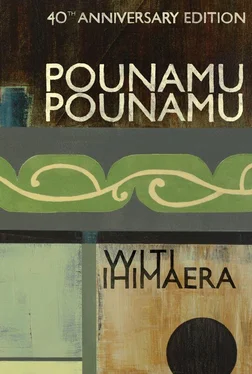One dark night, I went out there. The moreporks were hooting and circling around the house. The clouds were dark demons hovering in the sky. I prayed to God and tried to still my heart.
The lights were shining in the sitting room. Mr Hohepa was still up. I made my way round to the back door. It wasn’t locked. But I kicked something.
‘Who’s out there?’ a voice yelled.
‘Miiaaow,’ I answered.
No footsteps came. But I clung to the shadows for a long time, not daring to move. Then I sneaked inside.
I’m not a brave person in any circumstances. As I said before, I was always getting a hiding. So I must have really been in love with Mrs Jones to do what I did that night!
First, I looked in Mr Hohepa’s bedroom. My heart sank at the sight of it: there was so much junk in the room that it would be impossible to find one handkerchief. But, I reasoned, it must be somewhere obvious, probably in some kind of sacred place where he cast his spells. All I had to do was look for a place which looked sacred.
There seemed none in the bedroom. So I crept back along the corridor. It was then that the door to the sitting room opened. I had just enough time to hide before Mr Hohepa came out. He stood at the door and then his voice rang out:
‘Stay!’
But he wasn’t addressing me. He was addressing the person who was with him. It was Mrs Jones, sitting in a chair, a dazed look upon her face.
I had come too late.
Soon after that, school started again, and I had to quit my job. It was a relief in a way as I couldn’t bear to see Mrs Jones changing so much. She became thinner, and her personality seemed subdued. She hardly laughed. And once, when somebody said something against Mr Hohepa, she sprang to his defence like a cat spitting and snarling.
I never saw her much after that. I avoided her if I could, mostly because I had failed her. By then, everybody knew what was happening; that the makutu had been put on Mrs Jones, so no matter where I went, I always heard the latest about her. And at each report, she seemed to be getting worse, until finally she was broken.
Well, that’s my toenails done. Now I better gather them up and hide them. There’s great power in makutu.
Yes, Mr Hohepa got his own way in the end. He won against Mrs Jones. She began delivering his mail to his doorstep as before and she continued to do so until she retired. Old Hohepa, he made sure that Mrs Jones would always be under his will. He was sure cunning, that old fella, I’ll have to say that for him. I suppose, because I was in love with Mrs Jones, it’s no wonder I was the last to guess that she and Mr Hohepa would get married.
THE MAKUTU ON MRS JONES
Once I had decided to try writing short stories, the ambition kicked in. I had written plot outlines and short paragraphs on the wall of our farm when I was younger. When I was at Gisborne Boys’ High, Mr Grono, our English teacher, had awarded me the prize for best short story. And Nani Mini must have told some of her mates that I was writing because I overheard Mrs Waitaiki say to another kuia, ‘We’d better stop talking, here comes Witi-Boy Walton.’
Having an interest in writing and being serious about it, however, are two different matters. I realised that I had to get some technical know-how, so in 1970 I enrolled in a short story course run by Barry Mitcalfe in Wellington and, following that, I made it my goal to write one short story a month and try to get them published. Lo and behold, ‘The Liar’ was accepted by the New Zealand Listener on the very day my wife Jane and I were married, 9 May. One of the subeditors there was author Noel Hilliard who, before they accepted a second story, ‘The Child’, asked if I would meet him. When I walked into his office he looked at me and gave this huge grin, ‘I knew you had to be Maori but, mate, I wanted to make absolutely sure.’ He and his wife Kiriwai became great friends and mentors. Kiri worked in Post Office Headquarters sorting mail, and sometimes I would find her handwriting scribbled over my letters, ‘Kia ora Witi! Writing?’
‘The Makutu on Mrs Jones’ truly did begin when Jane kicked me out of bed because my toenails were too long — a story many of her students found dismaying. Of course I shouldn’t have had the main character cutting his toenails at night, as my mother, Julia, pointed out to me crossly, because that’s a cultural no-no; when the book came out, she was also irritated at some of the linguistic errors, which she said I should have known about. She also didn’t like the way I was satirising the concept of makutu.
Mum was one of the people who thought I was writing about the great Te Kani Te Ua, because there was a story circulating at the time concerning an altercation he was having with the Post Office and the delivery of his mail. The story is about him … and it isn’t.
Larry Parr made a short film of the story, with Annie Whittle playing the postmistress and Sonny Waru as Mr Hohepa.
When my Nani Miro died, her husband, my Nani Tama, stayed alone in their old homestead.
The homestead was right next to the meeting house, and set a little back from the road. It was a big house encircled by a verandah. Nani Tama used to sit there alone, basking in the sun. The people of the whanau would often visit him, bringing with them their crates of beer, and they would sing songs and talk about the old days with him. Nani Tama liked that. He would sigh and lean back in the wicker chair and dream. Then his old lips would quiver with emotion, and sometimes he would ramble on about the times gone, and about his wife, my Nani Miro.
‘She sure loved her cards,’ he would whisper. ‘Sometimes, I used to think how good it would’ve been if only I’d been a King of Clubs. She used to say that the King of Clubs was her lucky charm. Always got her out of trouble, she used to say. I don’t know why. I don’t know why.’ And he would smile to himself, remembering.
Sometimes, remembering made him sad. Then he would grasp his tokotoko, his walking stick, and you would see him shuffling slowly along the road, going through the gate at the bottom of the hill where the graveyard was, and up the slope to where the headstones pricked the skyline. There, beside Nani’s grave he would sit, a small black speck, unmoving against the rushing clouds and turning world, talking to Nani as she lay beneath the earth. Then, after a long while, you would see him descending the hill, the emerald sparkling slope, returning to the homestead.
I was waiting for him one afternoon, waiting for him to return. I’d come back home from Wellington on one of my infrequent holidays. From a long way off, I saw him and went to meet him. It had been a year since Nani Miro had been buried on the hill. After I had embraced Nani Tama, he looked up at me and whispered:
‘Your Nani was a great lady. All her life she kept Waituhi together. All her life she protected the land we live on and fought to get back the land that was taken away. Who will carry on the work now that she is gone?’
We sat on the verandah for a long time. We talked and laughed together, and we shared a beer.
‘Don’t tell me you booze now,’ he whispered.
‘I’m trying to catch up to you,’ I answered.
‘Boy!’ He laughed huskily. ‘You’ll never catch me up. I drink this stuff like water!’
I elbowed him playfully. ‘If Nani Miro was here, she’d soon put a stop to that. Look at you! You’re even skinnier than me now, you’re turning into a bag of bones.’
He chuckled. Then he beckoned me inside the homestead.
The homestead … As a small boy, I used to think it was like a palace. The wooden lattice-work fringing the verandah with its curved and whorled designs was like lace decoration. At each corner of the verandah were thin moulded and tapered columns, and the doors had panels of frosted glass in them. The windows too, were set with coloured glass, and I used to like peering out of them and seeing the world made crimson or green or deep, dark blue. From afar off, you saw the homestead like a big white wedding cake, gleaming on a sunny day.
Читать дальше












